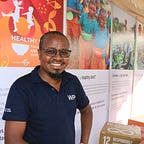To see Ethiopia truly prosper, malnutrition needs to be defeated
Sustained funding, early detection and treatment is critical
Tadelech Abraham is one of the mothers visiting Aldada Dela health post, just outside of the city of Hawassa in the Southern Nations, Nationalities, and Peoples’ Region.
Tadelech’s 2-year old daughter, Tagesech Henock, is not malnourished but is very close to being. Something as small as catching a common cold could send her falling below the threshold and have her classified as ‘wasted’ — a temporary condition but one that carries a high risk of death.
Tadelech’s visit to the clinic today may just save her daughter from this life-threatening condition.
“Today I learned the different types of foods that I can give my child to keep her healthy,” she says. “I also learnt that cleanliness is very important in keeping away diseases. The first thing I should do before touching any food is to wash my hands.”
The consequences of malnutrition should be a significant concern for policymakers in Ethiopia, where about 5.8 million children under 5 years (38 percent) are suffering from chronic malnutrition (stunting or low height-for-age), according to the most recent Demographic and Health Survey (DHS). This irreversible impact on the child’s physical and cognitive development has implications for the country’s GDP and hope for future growth.
The Cost of Hunger in Africa study for Ethiopia (2009) showed that 16 percent of the country’s GDP is lost yearly because of stunting.
While investing in education, and physical infrastructure such as bridges, roads, and markets, is important, eradicating stunting once and for all should remain a top priority.
Prevention, protection and education
Thanks to funding from donors including USAID, the World Food Programme (WFP), is working hand in hand with the Government of Ethiopia to fight malnutrition and prevent stunting.
Tereza Markos and Fikire Mathewos are the two health extension workers at Aldada Dela health post. They are the first point of contact for all health-related services.
The Government deliberately employs health workers from the local community, like Tereza and Fikire, as they speak the local dialect and are known to the villagers. There are over 40,000 such workers across Ethiopia — all serving their own kin.
Every two weeks the pair screen mothers and children at the clinic using the mid-upper arm circumference tape, to determine if they are malnourished.
On other days they walk door to door, village to village, seeking out pregnant or breastfeeding women and children under the age of five. A ready-to-use peanut-based paste is prescribed for children with signs of wasting, and a nutrient-packed flour for the mothers.
“This routine screening helps in catching cases of moderate acute malnutrition at the onset,” says Pauline Akabwai, a nutritionist with WFP. “If we can identify these children early on, we can treat the condition, which in turn allows us to avoid wasting or stunting.”
“Stunting is irreversible beyond the age of two years and it means that the person will never fully develop physically and mentally. They will simply never achieve their full potential,” explains Pauline.
Teaching mothers to teach others
Health posts are also used for health and nutrition education, with sessions held every two weeks. The health workers also give basic but often life-saving vaccines –measles, pneumonia or typhoid, or essential vitamin A and deworming pills.
The centre provides specialized nutritious food from WFP each month, as recommended by the health extension workers, while information and advice help families improve their diets. On top of this, a cooking demonstration is held every time the mothers come to collect their food.
Aster Tesfaye the community teacher, showing the women how to prepare the nutrient-dense porridge and administer the ready-to-use, peanut-based paste that she distributes.
Aster also teaches mothers the nutritious value of locally available foods and shows them how to prepare diverse meals. Education sessions also cover the importance of exclusive breastfeeding, and the need to always maintain hygiene.
“I did not know that I could mix vegetables and eggs and feed my children,” says Tadelech. “I have some eggs at home, but I was planning on selling them so that I can buy maize. This morning, I fed my baby corn bread — now I know that corn bread only is not enough — I need to give her other foods such as fruits, vegetables, eggs, and milk.”
Life-saving assistance at risk
Due to funding constraints, WFP is rapidly running out of products for the treatment and prevention of malnutrition.
In 2019, the nutrition sector estimates that a total of 2.8 million children aged 6–59 months and pregnant and nursing mothers will need treatment and rehabilitation for moderate acute malnutrition — to prevent wasting or subsequent stunting.
However, the current resources available are not sufficient to allow coverage of all the children and women in need. WFP has had to prioritise woredas (districts), that have the worst food and water scarcity, and rising rates of malnutrition.
With the funding available, WFP can only treat just over 315,000 children and 400,000 pregnant or breastfeeding mothers in 202 priority woredas, but only until end of May 2019.
For the next six months (until October), WFP urgently requires US$53.4 million to continue this life-saving support, without which the health and the future lives of millions will be at risk.
In 2019, WFP is treating malnutrition in children under five and pregnant or breastfeeding women thanks to the support of the Ethiopian Humanitarian Fund, EU Humanitarian Aid, Sweden, UK Aid and the United States Agency for International Development (USAID). In 2018, the Targeted Supplementary Feeding Programme was supported by (in alphabetical order): Austria, Canada, EU Humanitarian Aid, France, Sweden, Switzerland, and the United States of America.
Click here to read more about WFP’s work in Ethiopia
